Health Care Transformation to Advance Health Equity
Given the wide expansion of value-based payment (VBP) health care transformation models in the United States, VBP can be a useful tool for reducing health inequities and advancing equity goals. VBP models provide additional flexibility to address social needs, structural determinants of health, and social determinants of health, such as services and care coordination that are not typically covered (but may be particularly important) for people experiencing worse outcomes due to socioeconomic status, race, ethnicity, social needs, or other factors. Accordingly, many VBP models are now adopting a more intentional focus on equity. However, evidence suggests that VBP model uptake lags in marginalized populations, and sometimes may exacerbate disparities. Addressing equity through VBP remains a nascent field with diverse approaches, and limited evidence on which approaches work or help avoid undesirable outcomes.
Below is a portfolio of work to inform health policymakers and stakeholders with practical implementation and policy guidance on how to improve health equity through VBP approaches.
Funding and support for this work has generously been provided by the Robert Wood Johnson Foundation, Bass Connections at Duke University, and the Duke-Margolis Center.

ACO REACH And Advancing Equity Through Value-Based Payment, Part 2
William K Bleser, Yolande Pokam Tchuisseu, Humphrey Shen, Andrea Thoumi, Chinmay Amin, Deborah R. Kaye, Mark B. McClellan, Robert S. Saunders, Health Affairs Forefront, May 2022
To inform health policy makers and stakeholders on approaches to achieve equity through VBP, we scanned the literature and reviewed various policy initiatives. We spoke with experts implementing equity-focused VBP models or with expertise on these models. In part 1 of this article, we presented a framework for categorizing the spectrum of approaches we identified for improving equity through VBP model design. We also began discussing the key design elements for explicitly addressing equity in ACO REACH, highlighting examples of how some states and commercial payers have approached those same design elements and identifying additional opportunities for the Innovation Center and other parts of CMS, states, and commercial payers to continue to test ways to embed equity in VBP models. In this second and concluding part of the article, we continue that discussion.

ACO REACH And Advancing Equity Through Value-Based Payment, Part 1
William K Bleser, Yolande Pokam Tchuisseu, Humphrey Shen, Andrea Thoumi, Chinmay Amin, Deborah R. Kaye, Mark B. McClellan, Robert S. Saunders, Health Affairs Forefront, May 2022
To inform health policy makers and stakeholders on approaches to achieve equity through VBP, we scanned the literature and reviewed various policy initiatives. We spoke with experts implementing equity-focused VBP models or with expertise on these models. In this article, we present a framework for categorizing the spectrum of approaches we identified for improving equity through VBP model design. Below and in part 2, we discuss the key design elements for explicitly addressing equity in ACO REACH; highlight examples (and evidence or early lessons, where available) of how some states and commercial payers have approached those same design elements; and identify additional opportunities for the Innovation Center and other parts of CMS, states, and commercial payers to continue to test ways to embed equity in VBP models.

Improving Health Equity for Older People with Serious Illness through Value Based Payment Reform
Vishnukamal Golla, Nancy M. Allen Lapointe, Mina Silberberg, Virginia Wang, Trevor Lentz, Deborah Kaye, Corinna Sorenson, Robert Saunders, Brystana Kaufman, Journal of the American Geriatrics Society, April 2022
This articles provides four key considerations when designing value-based payment models, an increasingly used healthcare payment method for older adults.

The Case For Investment In Mobile Health Care Solutions To Reduce Health Inequities
Keren Hendel, Health Affairs Forefront, April 2022
This article won the AcademyHealth Disparities Interest Group’s student essay contest. Students were asked to write an editorial on any health disparities topic of their choice, with a focus on the specific causes or consequences of disparities and/or solutions with the most potential to reduce disparities. The article was edited by Health Affairs Forefront in conjunction with the author.
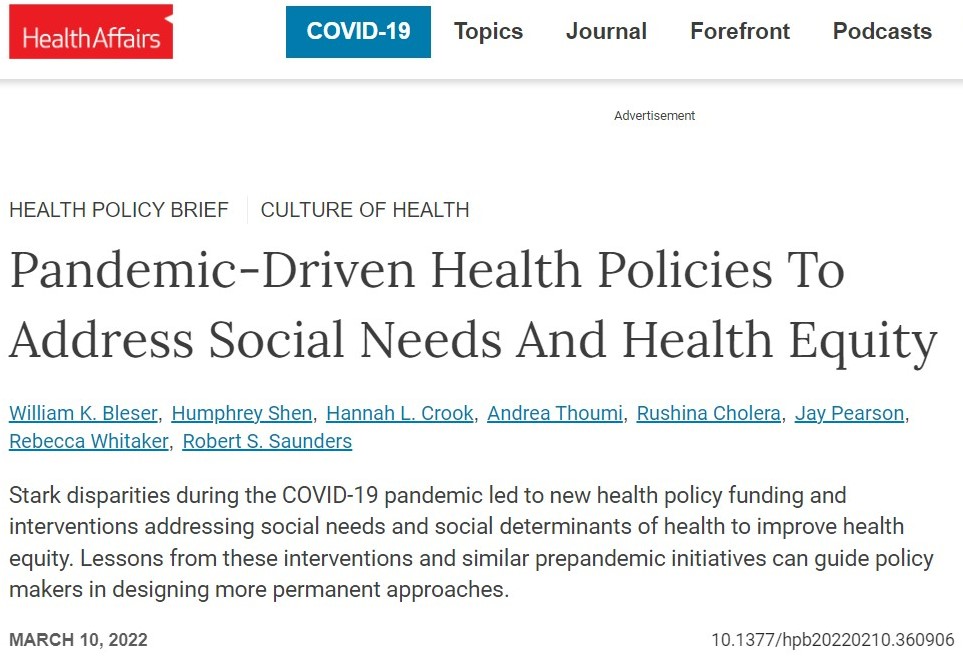
Pandemic-Driven Health Policies to Address Social Needs and Health Equity
William K Bleser, Humphrey Shen, Hannah L Crook, Andrea Thoumi, Rushina Cholera, Jay Pearson, Rebecca Whitaker, Robert S. Saunders Health Affairs Policy Brief, March 2022
Stark disparities during the COVID-19 pandemic led to new health policy funding and interventions addressing social needs and social determinants of health to improve health equity. Lessons from these interventions and similar pre-pandemic initiatives can guide policy makers in designing more permanent approaches.

Data Brief: Widened Racial Inequities in Underutilized Medicare Beneficiary COVID-19 Claims Files Illustrate Lifelong Structural Racism Exposure
William K Bleser, Hannah L Crook, Andrea Thoumi, Rushina Cholera, Jay Pearson, Robert S. Saunders, Rebecca Whitaker, Mark B. McClellan, March 2022
This Duke-Margolis data brief uses these Medicare data to study COVID-19 inequities and their upstream causes. We first examine rates of COVID-19 cases and hospitalizations by race and ethnicity. We then compare these differences side-by-side as disparity rate ratios relative to non-Hispanic White beneficiaries. Caseload disparities ballooned into wider-than-expected hospitalization disparities for BIPOC populations. Widened caseload-hospitalization ratios are best described neither as “differences” nor “disparities” but rather as “inequities.”
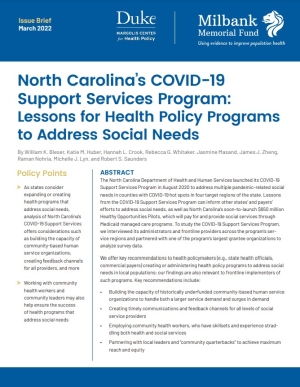
North Carolina’s COVID-19 Support Services Program: Lessons for Health Policy Programs to Address Social Needs
William K Bleser, Katie M. Huber, Hannah L Crook, Rebecca G. Whitaker, Jasmine Masand, James J. Zheng, Raman Nohria, Michelle J. Lyn, Robert S. Saunders, Milbank Memorial Fund, March 2022
We offer key recommendations to health policymakers (e.g., state health officials, commercial payers) creating or administering health policy programs to address social needs in local populations; our findings are also relevant to frontline implementers of such programs.
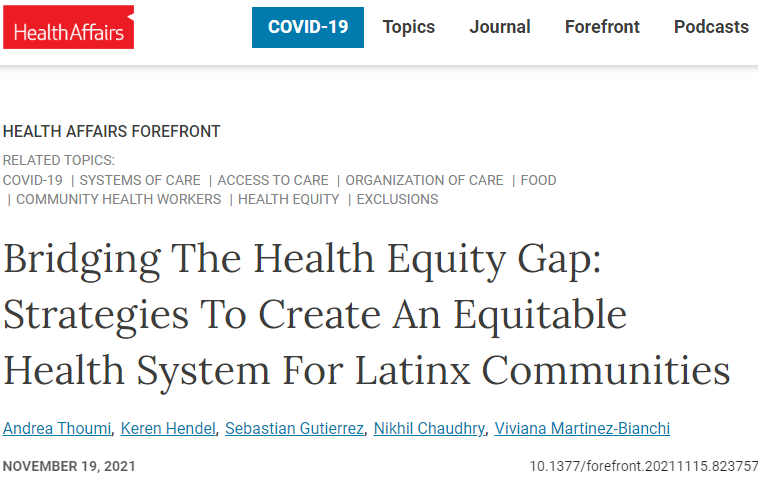
Bridging The Health Equity Gap: Strategies To Create An Equitable Health System For Latinx Communities
Andrea Thoumi, Keren Hendel, Sebastian Gutierrez, Nikhil Chaudhry, Viviana Martinez-Bianchi, Health Affairs Forefront, November 2021
The experience of health systems providing COVID-19 testing and vaccinations in partnership with community organizations elucidated equity gaps in care delivery. We describe three key strategies for creating policies that embed health equity principles in their design and implementation to move us closer to an equitable health care system.
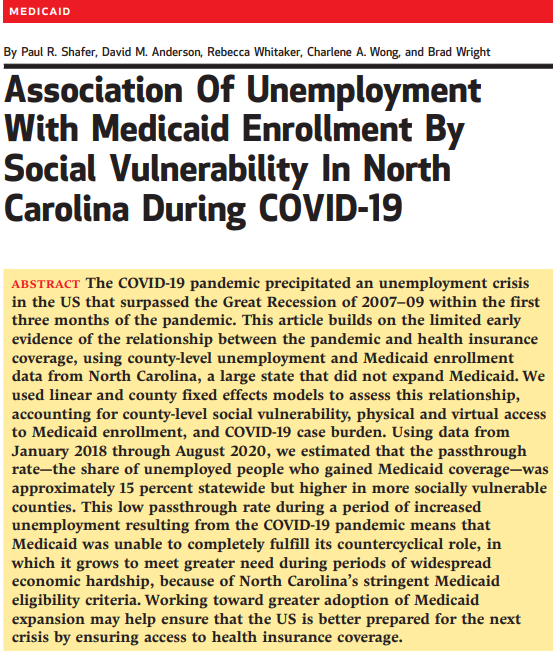
Association of Unemployment with Medicaid Enrollment by Social Vulnerability in North Carolina during COVID-19
Paul R. Shafer, David M. Anderson, Rebecca Whitaker, Charlene A. Wong, Brad Wright, Health Affairs, September 2021
This article builds on the limited early evidence of the relationship between the pandemic and health insurance coverage, using county-level unemployment and Medicaid enrollment data from North Carolina, a large state that did not expand Medicaid.

How Are Payment Reforms Addressing Social Determinants of Health? Policy Implications and Next Steps
Hannah L Crook, James Zheng, William K Bleser, Rebecca G. Whitaker, Jasmine Masand, Robert S. Saunders, Milbank Memorial Fund, February 2021
This issue brief summarizes the current landscape of payment reform initiatives addressing SDoH, drawing on results from a systematic review of peer-reviewed and gray literature supplemented with scans of state health policies and proposed payment reform models. It also discusses challenges and opportunities related to implementation — data collection and sharing, social risk factor adjustment (statistical methods for accounting for adverse social conditions associated with poor health), cross-sector partnerships, and organizational competencies — as well as policy implications and next steps so that states and payers can use value-based payment to encourage and promote addressing social needs.
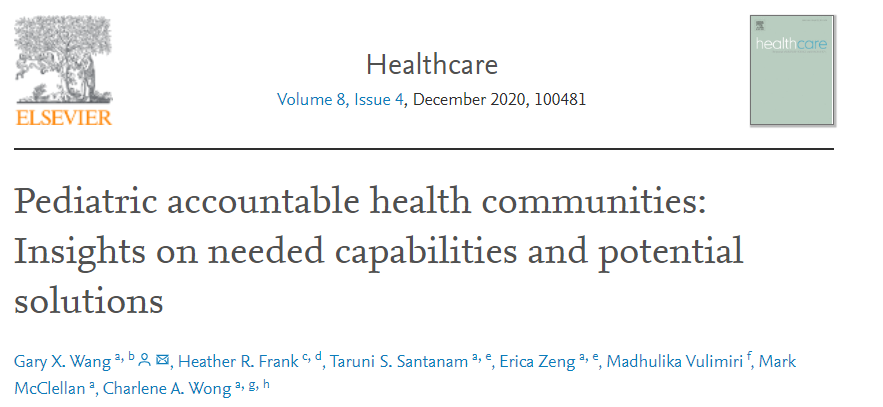
Pediatric accountable health communities: Insights on needed capabilities and potential solutions
Gary Wang, Heather Frank, Taruni Santanam, Erica Zeng, Madhulika Vulimiri, Mark McClellan, Charlene Wong, Healthcare, December 2020
Pediatric accountable health communities (AHCs) are emerging collaborative models that integrate care across health and social service sectors. We aimed to identify needed capabilities and potential solutions for implementing pediatric AHCs. Pediatric AHCs could provide more integrated, high-value care for children. Respondents highlighted the need for shared infrastructure and cross-sector alignment of measures and financing.
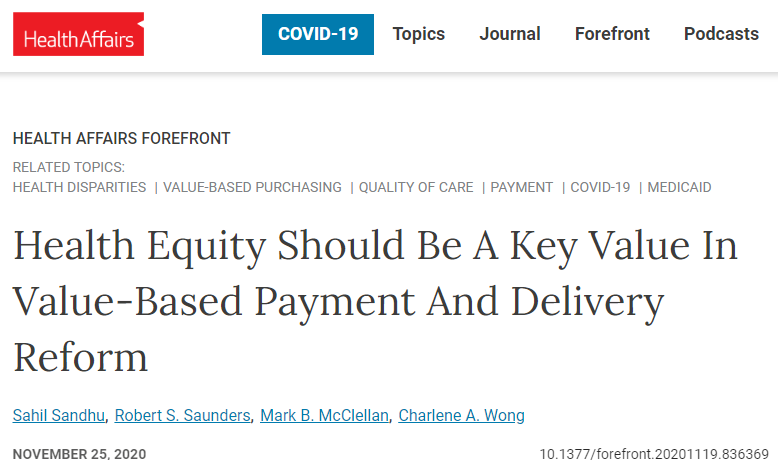
Health Equity Should Be A Key Value In Value-Based Payment And Delivery Reform
Sahil Sandhu, Robert S. Saunders, Mark B. McClellan, Charlene A. Wong, Health Affairs Forefront, November 2020
Value-based payment (VBP) structures have the potential to reduce health disparities, and during the pandemic, health care organizations with VBP models have had greater flexibility to effectively pivot their care delivery. However, too few organizations are actively prioritizing equity in their VBP models. We outline three strategies for payers and providers to embrace health equity in VBP design and implementation.
Guidance for Health Care Entities Partnering with Community-Based Organizations: Addressing Health-Related Social Needs in Alternative Payment Models
Health Equity Advisory Team, Health Care Payment Learning & Action Network (*Duke-Margolis team members were writers on this report as part of the HEAT Operator Team; see Acknowledgements on page 21.)
This guidance document provides recommendations and examples of health policy and payment mechanisms utilized to address health-related social needs (HRSNs) with a focus on collaboration between community-based organizations (CBOs) and health care entities involved in alternative payment model (APM) design and delivery.
Advancing Equity Through Value-Based Payment: Implementation And Evaluation To Support Design Goals
William K. Bleser, Yolande Pokam Tchuisseu, Humphrey Shen, Andrea Thoumi, Deborah R. Kaye, Robert S. Saunders, Health Affairs Forefront, November 2022
Following a two-part article that examines equity-focused design elements that can be embedded within VBP models, this paper further expands on additional equity-focused VBP design components, highlights key implementation considerations for how CMS, states, and commercial payers can maximize equity in VBP model rollout, and provides a brief overview of where equity-focused evaluation is needed to assess the success of equity-focused design and implementation.
Home-Based Care In Medicare Advantage, Part 2: Policy Recommendations For Equity And Longitudinal Care Experiences
Montgomery Smith, William K. Bleser, Jonathan Gonzalez-Smith, Bruce Leff, Robert S. Saunders, Health Affairs Forefront, November 2023
In this two-part article, we explore opportunities to scale equitable access and longitudinal care experiences with home-based care in Medicare Advantage (MA). In Part 1, we assessed recent regulatory changes and market investments in MA related to the provision of home-based care. Here, we highlight two sets of timely opportunities to advance home-based care through MA, specifically actions that can improve equitable uptake of offerings and reduce administrative burden for home-based care in MA.
Duke-Margolis Team

William K. Bleser, PhD, MSPH
Research Director, Health Care Transformation for Social Needs and Health Equity
Senior Team Member
Anti-Racism and Equity Committee Member

Nancy Allen LaPointe
Faculty Fellow, Duke-Margolis Institute for Health Policy
Margolis Core Faculty
Adjunct Associate Professor in the Department of Medicine Faculty

Rushina Cholera, MD, PhD
Assistant Professor, Department of Pediatrics and Population Health Sciences
Medical Instructor in the Department of Pediatrics
2020 Intern Mentor
Anti-Racism and Equity Committee Member
Margolis Core Faculty

Katie Huber, MPH
Policy Research Associate

Brystana Kaufman, MSPH, PhD
Assistant Professor, Population Health Sciences
Margolis Core Faculty

Deborah Kaye, MD
Assistant Professor of Surgery
Margolis Core Faculty

Trevor Lentz, PhD
Assistant Professor in Orthopaedic Surgery
Margolis Core Faculty

Mark McClellan, MD, PhD
Director of the Duke-Margolis Institute for Health Policy
Robert J. Margolis, MD, Professor of Business, Medicine and Policy
Margolis Executive Core Faculty

Sahil Sandhu
2020 Margolis Intern

Mina Silberberg, PhD
Associate Professor in Family Medicine and Community Health
Margolis Core Faculty

Corinna Sorenson, PhD, MHSA, MPH
Faculty Director of Undergraduate and Graduate Studies
Senior Advisor and Founding Director, Margolis Scholars Program
Assistant Professor in Population Health Sciences and Public Policy
Margolis Core Faculty
Anti-Racism and Equity Committee Member

Robert Saunders, PhD
Senior Research Director, Health Care Transformation
Adjunct Associate Professor
Executive Team Member
Margolis Core Faculty

Rebecca Whitaker, PhD, MSPH
Research Director, North Carolina Health Care Transformation
Core Faculty Member
Senior Team Member
Anti-Racism and Equity Committee Member

Virginia Wang, PhD
Associate Professor in Population Health Sciences
Margolis Core Faculty

Charlene Wong, MD, MSHP
Assistant Professor of Pediatrics
Margolis Core Faculty
2020 Intern Mentor

James Zheng
2020 Margolis Intern
2021 Margolis Intern


